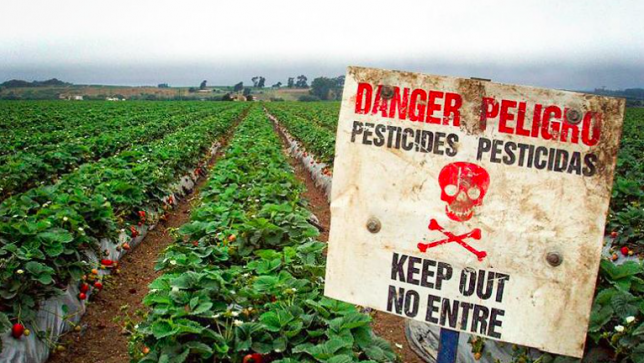The United States of America allows the use of 85 pesticides that have been banned or are being phased out in the European Union, China or Brazil, according to a peer-reviewed study published today by the academic journal Environmental Health.

In 2016 the United States used 322 million pounds of pesticides that are banned in the E.U., accounting for more than one-quarter of all agricultural pesticide use in this country, according to the study. U.S. applicators also used 40 million pounds of pesticides that are banned or being phased out in China and 26 million pounds of pesticides that are banned or being phased out in Brazil.
“It’s appalling the U.S. lags so far behind these major agricultural powers in banning harmful pesticides,” said Nathan Donley, a senior scientist with the Center for Biological Diversity and author of the study. “The fact that we’re still using hundreds of millions of pounds of poisons other nations have wisely rejected as too risky spotlights our dangerously lax approach to phasing out hazardous pesticides.”
The study compared the approval status of more than 500 pesticides used in outdoor applications in the world’s four largest agricultural economies: the United States, European Union, China and Brazil.
Report Highlights
- The U.S. EPA continues to allow use of 85 pesticides for outdoor agricultural applications that are banned or in the process of being completely phased out elsewhere, including 72 in the E.U., 17 in Brazil and 11 in China.
- The United States has banned only four pesticides still approved for use in the E.U., Brazil or China.
- Pesticides approved in the United States but banned or being phased out in at least two of the three other nations in the study include: 2,4-DB, bensulide, chloropicrin, dichlobenil, dicrotophos, EPTC, norflurazon, oxytetracycline, paraquat, phorate, streptomycin, terbufos and tribufos.
- The majority of pesticides banned in at least 2 of the 3 nations studied have not appreciably decreased in the United States over the past 25 years and almost all have stayed constant or increased over the past 10 years. Many have been implicated in acute pesticide poisonings in the United States, and some have been further restricted by individual states.
The study concludes that deficiencies in the U.S. pesticide regulatory process are the likely cause of the country failing to ban or phase out pesticides that the E.U., China and Brazil have prohibited.
The Federal Insecticide, Fungicide, and Rodenticide Act gives the U.S. EPA significant discretion on which pesticides to cancel and makes the EPA-initiated, nonvoluntary cancellation process particularly onerous and politically fraught. This has, in effect, made pesticide cancellation in the United States largely a voluntary endeavor by the pesticide industry itself. As a result, pesticide cancellations in the U.S. are more often economic decisions rather than decisions made to protect human or environmental health.
“Bans are the most effective way to prevent exposures to highly hazardous pesticides and can spur the transition to safer alternatives,” said Donley. “A combination of weak laws and the EPA’s broken pesticide regulatory process has allowed the pesticide industry to dictate which pesticides stay in use. That process undermines the safety of agricultural workers and anyone who eats food and drinks water in this country.”
The U.S. EPA’s Pesticide Office has come under intense scrutiny in recent years as a result of numerous scandals, including:
- Ignoring its own established protocols to conclude that glyphosate, the active ingredient in Roundup, does not cause cancer, a finding that’s at odds with the World Health Organization’s International Agency for Research on Cancer, EPA’s Office of Research and Development and the U.S. Department of Health and Human Services’ Agency for Toxic Substances and Disease Registry;
- Its refusal to protect endangered species from pesticides, even when it’s been demonstrated by other federal agencies that use of the chemicals could put certain species at risk of extinction;
- The agency’s industry-motivated decision to overturn a long-overdue ban on chlorpyrifos despite compelling evidence that it harms the brains of children;
- The recent approval of the largest ever expansion of medically-important antibiotics for use in plant agriculture, ignoring strong concerns about increased antibiotic resistance from the FDA, CDC and public health officials;
- Having to change the instructions on the dicamba pesticide label twice after the drift-prone pesticide damageda reported 5 million acres of crops, trees and backyard gardens over the last two years.
- It’s liberal use of an “emergency” exemption loophole that allows unapproved pesticides to be used for routine, foreseeable situations for many consecutive years.



















Would you please provide the commercial names, the names of these pesticides, that they are marketed under. Thanks.
Great site by the way.
We need a Safe Food Protection Agency ( SFPA ) with the power to outlaw any poisonous pesticide or genetically modified food based on purely independent research without recourse or appeals of any kind.
This is to only way to halt the growing intestinal sicknesses in our population and continuing decline in our life span compared withe nations who strictly control food toxins.
Please send this idea to President Trump and request a hearing,